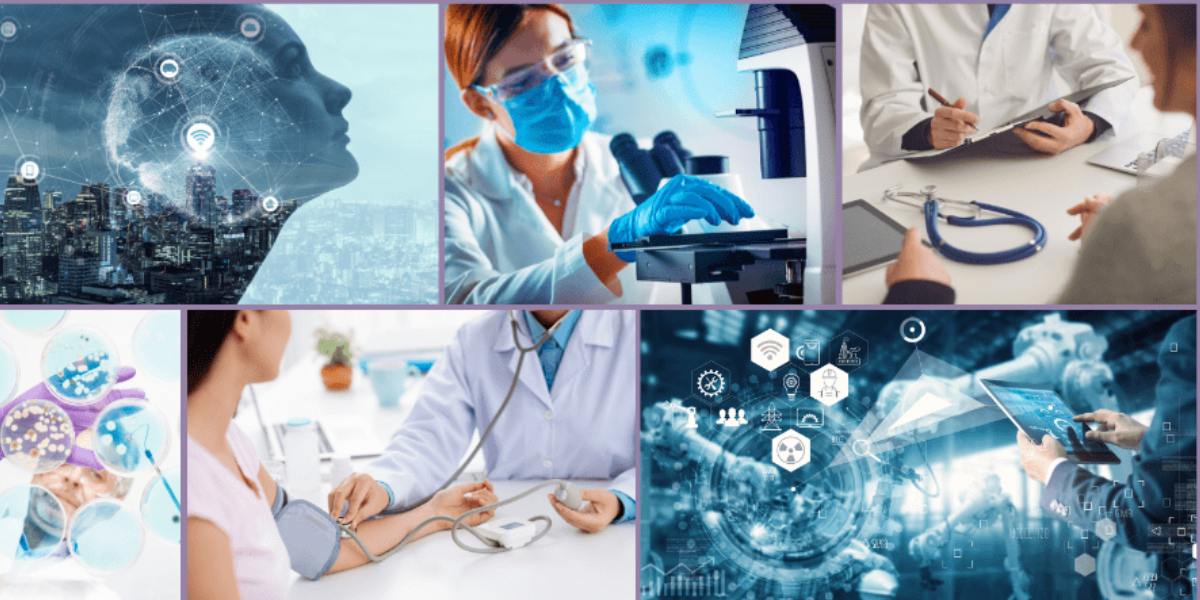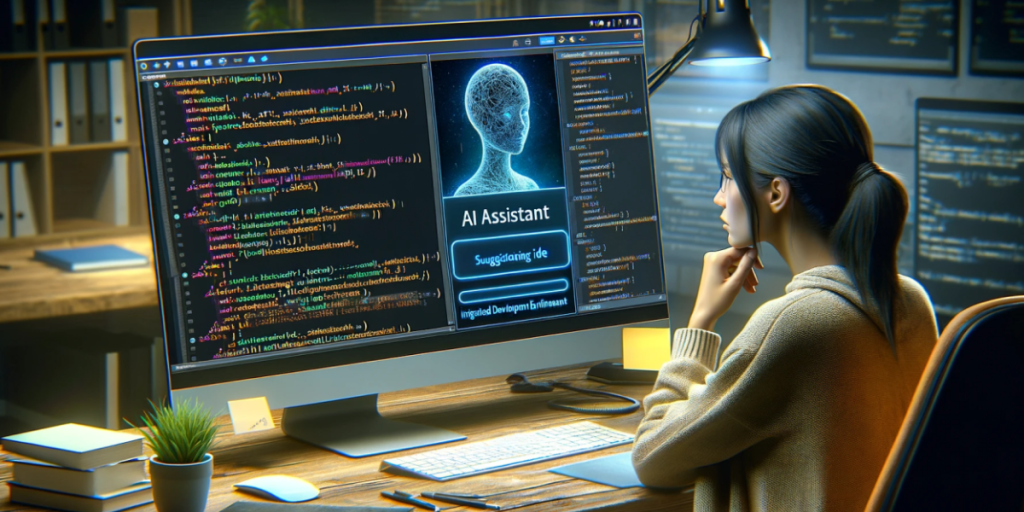In the ever-changing, fascinating environment of the life sciences sector, the constant pursuit of innovation is crucial for progressing and developing the research process. AI and machine learning are game changers at the forefront of technologies enabling this revolution. Life sciences are not a stranger to innovations and constant change, as evidenced by ongoing advances in areas such as the discovery of drugs, diagnostic tools, and personalized medicine. The change is affecting scientists and has substantial implications for the marketers who work in the industry.
The effect of AI Applications In Life Sciences can be seen for sure. The intersection between AI and life science is not only concerned with merging technology; it is also causing profound societal changes. AI has accelerated research into drugs, altering the way people diagnose illnesses and making the healthcare system more efficient. This technology is driving the pace of advancement and innovation in the field of life sciences.
In this blog, we’ll examine how AI profoundly impacts different aspects of life science and how it expands life sciences growth potential in 2024.
AI In Life Science Analytics Market For Growth
AI is expected to be around 5.10 billion in the life sciences analytics market by 2032. The demand for a more efficient process for identifying drugs is growing, and demand for customized healthcare solutions is increasing. A growing amount of healthcare information, technological advancements in AI algorithms and computing capabilities, possibilities for cost reduction, and enhanced decision-making within the field of medical sciences.
The AI analytics market in the life sciences has witnessed impressive growth in the last few years due to the rising use of AI techniques in biotechnology, pharmaceuticals, and healthcare. AI is changing the face of life sciences analytics, including drug development and discovery, individualized medicine, and healthcare. In addition, AI-powered analytics can provide advantages such as better decision-making capabilities, reduced cost, and increased efficiency. They help researchers and health experts gain valuable insight through complex data, which can lead to efficient treatments and treatments.
This is why pharmaceutical firms, research institutes, and healthcare professionals have been investing more heavily in AI techniques to achieve advantage and solve essential issues within the field of life sciences. As technology advances in AI algorithms, machines, machine-learning techniques, and computing capabilities, AI in the life sciences analytics market is set to continue growing and advancing within the next decade.
The Growing Impact Of AI In Life Sciences
Artificial Intelligence (AI) has rapidly revolutionized many industries, and the life sciences field is no exception. Incorporating AI in biological and medical sciences has allowed researchers to use vast amounts of data, create precise forecasts, and address complicated medical issues. Even in its initial stages, AI has already shown potential in the life sciences sector, and we expect to discover many ways to use this technology shortly. As we continue to advance AI development, its applications in life science are bound to become more diverse and influential. It is positioning AI as a powerful tool that can improve the quality of research and enhance business operations.
Drug Development
Artificial Intelligence (AI) is set to transform drug development in life sciences by significantly speeding up the process while increasing overall efficiency. By integrating huge amounts of data from diverse sources, such as the proteomics and genomics fields and clinical tests, AI algorithms can swiftly determine potential drug candidates and speed up the testing of targets. Additionally, AI-powered systems will be able to determine the effectiveness of drugs in terms of safety, efficacy, and adverse side effects. They can also drastically cut down the amount of time needed for trials in the clinical and preclinical stages.
AI’s use in drug development can help promote precision medicine by creating targeted treatments specific to certain patient populations. However, this raises questions regarding the confidentiality of information, ethical issues, and other regulatory issues that must be tackled with the same significance. The result is that embracing AI for drug development can revolutionize the field of life sciences by speeding up new therapies that go from the lab to the market, decreasing costs, and improving patient results.
Drug Discovery And Research
The influence of AI in drug discovery and research is more than just speeding the development process. It can also create innovation and incite new treatments. Machine learning algorithms could assist researchers in understanding complex molecular structures and identify connections previously not recognized between genes, diseases, and experimental or existing therapies. This wealth of new information could lead to breakthrough treatments that could treat previously untreatable conditions and enable the repurposing of current medicines for new uses.
AI helps create a coordinated global effort to address pressing health issues while ensuring that essential data is effectively and legally exchanged between the various stakeholders. In addition, innovative research strategies using AI and robotics, including high-throughput screeners, allow faster analysis of thousands of molecules to determine their therapeutic activities. As AI evolves and continues to develop, its drug research use will likely grow, changing how we think about disease detection, prevention, and treatment.
Clinical Trials
Generative AI In Life Sciences is revolutionizing clinical trials within the healthcare sector, making it possible to conduct faster, more efficiently, and more likely to be accurate. With the help of vast amounts of information, AI aids researchers in conducting and designing clinical trials, identifying ideal target populations, and forecasting outcomes. It also helps with the retention and recruitment of patients by providing appropriate and relevant details to the participants.
Additionally, AI-driven automation increases the real-time monitoring of adverse events and data analysis to ensure safety and improve trials’ decision-making processes throughout. However, privacy issues, regulatory compliance, and ethical concerns should be considered to maximize AI’s potential during clinical research trials. Therefore, striking an equilibrium between AI’s potential positives and drawbacks is crucial to shaping the future direction of clinical research within the healthcare sector.
Personalized Medicine And Precision Healthcare
Personalization of medical care and precision health have gained a lot of importance in life sciences. They use AI to study genetic data, forecast disease progression, and detect biomarkers that can be used to tailor treatments. This strategy improves patients’ outcomes and lowers the costs and adverse reactions associated with traditional medical treatments.
AI-driven personalized medicine can potentially alter the healthcare landscape and offer more precision. By analyzing patient data, AI can identify patterns that help healthcare professionals make better decisions regarding the best treatment options and customized health strategies.
AI Applications In Medical Imaging And Diagnostics
AI applications for diagnosis and medical imaging are changing how we treat patients by facilitating early disease detection, such as translating images to images and case prioritization. They not only enhance the quality of care and experience for patients, but they also hold the promise to save lives by detecting dangerous diseases in their early stages. AI algorithms can analyze medical pictures and identify possible signs of illness, providing physicians with better diagnoses and improving patient care. Additionally, AI can be utilized to identify various medical conditions, such as diabetes retinopathy and heart disease.
AI-driven image–to–image conversion transforms the source image into a desired image, making it possible to use various software, such as converting night images from day images or sketches into genuine photographs. AI techniques and models are available to translate images. AI determines the most urgent cases by using information from medical images and patient medical records to determine the most urgent cases and then allocates resources according to the need. It enhances patients’ care and guarantees that resources are devoted to the most pressing cases, thus reducing expenses and increasing effectiveness.
AI Expanding Life Sciences Growth Potential 2024
Today, the advent of AI (AI) opens up new possibilities for businesses to progress to the next stage of the digital transformation process. This latest innovation goes beyond just implementing new technology or enhancing current methods. It is paving the way for a future in which innovations and greater performance rates result in a greater understanding of the latest individualized medications and faster and smoother launch of lifesaving treatments.
A New Foundational Element To The Value Model
Mid-sized life sciences companies have an advantage due to their capacity to quickly adapt, pivot in-depth, and swiftly implement changes to their operations compared to their more affluent counterparts. Implementing AI in business workflows, processes, and systems can result in efficiency-enhancing operations that result in quicker and better strategic outcomes.
In particular, the combination of AI adoption and the life sciences value chain helps to increase the scale of R&D and manufacturing capabilities, which have a real-time impact on supply and demand. In time, companies will be able to reduce their operational costs and improve performance through the use of data-driven information, which are both essential for competitive advantage in encouraging expansion and efficiency.
Focusing Traditional ROIi Metrics Towards The Value Of Each
Fully utilizing AI’s full potential depends on developing and applying ROI measures for investments in digital technology that are exclusive to a business’s ecosystem. By steering clear of conventional quantitative metrics like cost reduction, product capacity, time to market, and revenue margins. Companies can better understand the value of their investments over a long time frame.
A value-based perspective is crucial because AI can impact different business functions through more minor, more tangible effects that ripple throughout the company. This requires a careful evaluation, which breaks each impact into tangible components, for example, increasing productivity, improving customers’ experience, and improving the efficiency of operations. It’s interesting to note that value-based analyses aren’t entirely new. It is in profound agreement with the existing methods used by industry in R&D and clinical trials. Other research-related activities are managed by complex operational frameworks, rigorous regulatory governance, and a wide range of ecosystem-dependent dependencies.
Applying this method of value-based investment to AI investments will transform organizations. They’ll understand how to increase effectiveness, speed, accuracy, and benefits in areas where every minute and penny is important. Particularly in schedules, planning, and management of supply chain manufacturing processes, the selection of vendors, and the best care for patients.
Modernizing An Industry Through Real-Time Intelligence
Mid-sized life science companies increasingly use AI to improve their processes, resulting in significant changes within the market. Focusing on the outcomes, they aren’t solely implementing new technologies; they have also pushed for significant advances in research and healthcare. The integration of AI allows these companies to gain new insight to streamline processes, improve efficiency, and improve decision-making rapidly.
This trend highlights the vital importance of technology within this industry and suggests a future in which AI-driven innovation continually pushes the limits of what’s possible. Its enormous implications range from speedy research into drugs to personalized medicine that fundamentally changes how healthcare products are created and dispensed. In the process of continuing to invent, they’re creating new standards of effectiveness and efficiency within the field of life sciences and demonstrating the significant influence of real-time technology on industry evolution.
Driving Factors Of AI In The Life Sciences Market
Generative AI is revolutionizing the industry of life sciences because of several pivotal elements:
Drug Discovery Optimization
The conventional process of identifying drugs is usually lengthy and costly. Generative AI is a revolutionary approach, using sophisticated algorithms that can sift through massive databases and pinpoint promising drug candidates with incredible efficiency and precision. The algorithms can predict the effectiveness of compounds and enhance their molecular structures, dramatically speeding up the process of developing drugs and reducing the associated costs. With its rapid insight into the feasibility of novel medicines, AI is helping pharmaceutical companies to bring novel therapies to market quickly.
Personalized Medicine
The most intriguing AI Use Cases In Life Sciences is personalized healthcare. AI-driven models examine various patient data, such as personal characteristics, genetic information, and medical histories, and tailor treatments to a patient’s needs. This method increases the efficacy of treatment and reduces the risk of adverse reactions because the individual particulars of each patient tailor treatments. The concept of personalized medicine is a major advancement in pursuing better results for patients and better satisfaction.
Genomics And Biotechnology Advancements
Generative AI is at the cutting edge of genomics research and allows scientists to explore the complexity of genetic data. AI tools can process and interpret massive quantities of data from genomics, predict the functions of genes, and pinpoint biomarkers crucial to diagnosing various illnesses. This technology enables breakthroughs in human health, which will aid in creating targeted treatments and improving our understanding of genetic conditions. The synergy of AI and genomics pave the way for breakthrough discoveries in precision medicine and biotechnology.
Precision Healthcare
AI enhances precision healthcare through the provision of advanced diagnostic tools and decision-support tools. The AI-powered solutions increase diagnosis accuracy, forecast prognosis, and assist in choosing suitable treatment options. Healthcare professionals can utilize the tools available to offer specific and personalized treatments, improving patient outcomes and utilizing medical care resources. Integrating AI within clinical settings transforms healthcare services, making them more efficient and accurate.
Collaboration And Data Sharing
AI-powered platforms that enable data and analysis sharing improve the nature of collaborative scientific research. The platforms combine heterogeneous data sources, allowing scientists, clinicians, and pharmaceutical companies to collaborate more efficiently. AI drives progress within the life sciences industry by promoting innovation and sharing. Improved collaboration facilitated by AI will result in faster advances in medical research and the creation of innovative treatments that will ultimately improve the whole area.
Ethical Considerations And Regulatory Compliance In Life Sciences AI
With AI’s constant reshaping of the life sciences sector and the implications for ethics, taking care of ethical issues and regulatory compliance is crucial. This is a matter of:
Security And Privacy Of Data
Robust security measures are important to protect sensitive information in life sciences AI applications, such as those involving patient information. Privacy and data security can be accomplished with guidelines that set the standards for data collection, storage, and utilization. Data encryption, secure information storage, and access control are all possible ways to guard sensitive data against unwanted access or abuse.
In AI, Bias Is a Factor In AI Algorithms
Eliminating any biases that may exist within AI algorithms is necessary to guarantee fair and precise outcomes for life science applications. Factors contributing to bias in AI may include bias in training data, biased assumptions in algorithm development, the human decision-making process in selecting data, and the implementation of algorithmic outcomes. Utilizing data sets typical of the populace, clear and understandable algorithms, and fairness-aware machine learning. Life sciences companies reduce the chance of bias-driven outcomes.
Compliance With The Regulations
The need for regulatory compliance is vital to AI implementation in the field of life sciences. Organizations such as the FDA are creating frameworks to support AI-based medical equipment. The FDA’s regulatory framework is built around transparency, clarity, and the confirmation of AI algorithms to ensure that AI techniques are secure and efficient for use in the life sciences field.
Summary
AI is poised to transform the life sciences field by accelerating drug development and discovery, enhancing clinical trials, and enabling personalized medicine and precision health. Numerous real-life AI successes in the life sciences show this technology’s enormous potential to improve patients’ quality of life, cut costs, and accelerate the diagnosis and treatment process. This is probably one of the most intriguing cases in which AI can be used.
As AI advances, Life science marketers could gain from improved information analysis, personalized information, and more efficient messages for different stakeholder groups. Utilizing the capabilities of AI while dealing with its issues is essential to remain relevant and competitive within this ever-changing market. Future developments promise an integration of technologies and life sciences. This will create a new future in which AI can significantly shape the future of pharmaceuticals and healthcare.

























